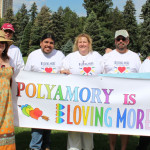
On Wednesday April 7, 2010 at the Conference on World Affairs a panel presentation was being presented From Monogamy to Polyamory and Everything in Between. Wow this is great that polyamory is being included in the Conference on World Affairs held annually at the University of Colorado in Boulder. Just one problem, on the panel of “experts” there was not one person who really knew or understood polyamory. The local polyamory group in Boulder caught wind of this via Amy Gahran and Loving More was contacted. We decided we needed to attend this panel discussion. Maybe it was not so bad, maybe one or two panel members did have knowledge but we just didn’t know them. I went with an open mind hoping mine and the concerns of the community were unfounded. Sadly they were not.
When I arrived the doors were closed and people wanting in would need to wait and see if anyone departed. It was standing room only in the large auditorium with a large crowd waiting to get in. I started talking to people who were waiting and most were there because they were interested in this discussion that included polyamory. Polyamory was what brought many of them there.
 After about ten minutes the crowd waiting had thinned and several people left so we were able to duck in to the panel. The panel was still introducing themselves and they were on the second panelist. Each panelist talked about how their personal experiences made them experts in this subject. Mostly they talked about their own background either professionally or with relationships. All were monogamous and all talked about monogamy and infidelity. Three barely mentioned polyamory in passing and one stated polyamory made sense biologically but he was not sure it could work logistically. This was the only positive thing said about polyamory by any of the panelists. At best they were unfamiliar with polyamory and at worst they were condescending making statements about how polyamory is impractical or not socially acceptable and therefore people would not really consider it.
After about ten minutes the crowd waiting had thinned and several people left so we were able to duck in to the panel. The panel was still introducing themselves and they were on the second panelist. Each panelist talked about how their personal experiences made them experts in this subject. Mostly they talked about their own background either professionally or with relationships. All were monogamous and all talked about monogamy and infidelity. Three barely mentioned polyamory in passing and one stated polyamory made sense biologically but he was not sure it could work logistically. This was the only positive thing said about polyamory by any of the panelists. At best they were unfamiliar with polyamory and at worst they were condescending making statements about how polyamory is impractical or not socially acceptable and therefore people would not really consider it.
As they finished their introductions they opened the forum to questions. They called on a young woman behind me; she asked if polyamory could be a solution for couples with children who want to stay together but are no longer romantically compatible. The panelists seemed dumbfounded and when one finally answered he said something to the effect that it probable was not a reasonable solution. In the panel of so called experts they continually pushed polyamory off to the margins. It was subtle and they were not even aware of their own prejudices or that they were doing it. I asked why a panel discussion that included polyamory had no one in the panel who knew anything about polyamory when there are many people available to speak to this issue. People applauded when I asked the question. The panel understandably became a bit defensive and said they felt they were doing fine They asked if they had misrepresented things and I said yes, that polyamory was a growing movement with thousands if not millions of people involved successfully across the country and around the world. I had a chance to clarify a few things to the group and let people know there was quality information available (much of which I had with me and gave out).
The panelists it seems were chosen by the organizers and therefore not responsible for the lack a of knowledgeable polyamory panelists. On one hand I agree with this and on the other I take a different stand. When I was asked to speak on the spectrum of non-monogamous relating styles including swinging, I made an effort to learn. I am not a swinger and though I know more than the average person, I am no expert on swinging. I did some research before speaking and learned what I could so I could speak intelligently about the subject. This was not terribly hard since though swinging and polyamory are at different ends of the open relationship spectrum, they share many of the same challenges. The point is I educated myself so I could represent swinging in a real and viable way. So to me the panelist share some responsibility. Get educated or tell the organizers to include a person who is truly an expert on the subject.
This incident is not isolated. Unfortunately it happens all the time, most notably in the media. The worst are the talk shows like Oprah and others. When Oprah included open relationships on a show on sexuality her so called expert knew nothing about polyamory or open relationships. The “expert” pursed her lips and spouted how open relationships never work because like in cheating people can’t get past jealousy. In my experience both personally and working with clients it is broken trust that people have so much trouble overcoming. This may lead to or involve jealousy but it is rebuilding trust after infidelity that ultimately kills the relationship when a spouse has cheated. Polyamory and swinging are built on trust and are not cheating.
On Montel in 2007 in a show on alternative families one of the experts was the judge from divorce court. She compared kids raised in polyamory to single mothers on welfare who have a new boyfriend every month and give that man authority over their kids. On the same show Montel stated that just a very small fraction of less than one percent of the population would ever have an interest in polyamory. I objected saying I disagreed and when he asked the audience at least twenty five percent raised their hand saying they would be interested in a multi-partnered relationship. This part of course never aired.
These are examples from just two shows and it happens in all kinds of venues. I wonder why it is that seemingly educated well versed people are so ignorant. It would be one thing if they were out there saying “gee, I don’t know if polyamory can work”, versus expertly speaking to polyamory as if it never works and never will. In one recent story, where Jenny Block was interviewed by a local Dallas station, the expert was a marriage counselor who said he did not know of anyone who had a successful open relationship and that open relationships didn’t work. In the same show they are talking with Jenny Block who has been in an open relationship for 12 or so years. It is as if having their “expert” commentator validates that someone like Jenny is a fluke and we really do not need to take these open relationships serious. What it really speaks to is the undeniable ignorance and unwillingness to learn about a growing movement and the viability of relationships outside the box of monogamy and the nuclear family.

People often fear what they do not understand. Polyamory and other open relationships make many people uncomfortable. Many have enough problems making one relationship work while others may have desired or loved more than one person but they denied themselves. Either way I believe that in part open relating is marginalized in the mainstream because it challenges people at their core. When you examine polyamory and swinging closely it is hard to find a reason that it is wrong. These relationships are built on honesty, being real, sharing fantasies, love and commitment and the people involved are often normal happy people. It is easier for people to marginalize open relating because if it is not marginal it might open the door to question monogamy. People might have to question whether they have the kind of relationship they want and that might lead to guilt, shame, jealousy and a myriad of deep emotions most people do not really want to look at. By saying it doesn’t work or is really just a few weirdoes on the fringe of society then people do not have to peak out of the box and possibly rock the boat of their lives.
It is really up to us, Loving More and the greater polyamory community to educate and speak up especially when experts who are not experts marginalize open relationships; perhaps even writing in to Oprah or Hollywood producers who misrepresent polyamory, swinging and other choices beyond monogamy. If you hear something on the radio or TV that is misinformation, let us know. Become aware of what is being said around you and don’t be afraid to speak up or if you can’t safely find someone who can. Give out the Polyamory Info/FAQ brochure, it is available free. Let us speak out together and inform the world that open relationships can work and be wonderfully rich, satisfying, deeply intimate and nurturing.








Very well stated, Robyn, and thank you for speaking up! 🙂
Really great, Robyn. Thanks for this. You express the frustration that I (and many others) have felt over the years when our heartfelt (and hard worked-for) views and lifestyles are dismissed by the ignorance or fear of others.
My experience of polyamory and open relating has led me to the conclusion that I would never, ever want anything else. The personal rewards (for me and my partners) are too great, despite the challenges.
May we continue to work together to educate others about how allowing love to flow, and create its own forms, can become a foundation that enables a global healing that can benefit us all.
Peace & Love,
– Randy
FEAR is the key to understanding the sceptics. Unconsciously, many will reject ideas, not because they are bad, but because their own upbringing and mindset leads them to fear what is new or challenging. Mainstream mass media do not look in much detail at peripheral ideas in many areas, including economics, business and science, even if they lead to a better understanding of more popular beliefs.
Most people believe they are their own best advisor in matters of the heart and living.
Monogamists can learn a lot about relationships from the lessons of polyamory and those who write about it, live it and those who counsel those who practice it. The best thing is to show those who doubt what benefits there are. Many good ideas take decades to be accepted.
A full exploration of jealousy and what is behind it should be a priority for polyamorists.
Why do monogamists cheat? Keep asking the questions and be slow to provide answers. The best answers are often the ones we discover within ourselves. Henry Bauress
I recently attended the Psychotherapy Networker Symposium in Washington, DC, where I worked as a volunteer. I had to good fortune to attend all the workshops I wanted, including two that specifically addressed polyamory. My partner, Christiane, also attended, but did not attend the same workshops.
In one workshop, Dr. Tammy Nelson, a therapist in New York, presented on “The New Monogamy” and gave a very competent talk that was neither pro nor anti polyamory. Tammy’s main point is that therapists have to be aware of the many different relationship styles people are involved in, and it is not for you, the therapist, to judge what is right or wrong about them. You have to meet the clients on their turf and listen to their reality. Poly relationships have the same issues other relationships have and it does not help your clients to deny their reality.
Tammy also mentioned a figure of 1.3% of the population involved in poly, although I don’t know where she got the figure. That’s about 4 million people!
She mentioned that it’s not for her, but she asked if anyone had a child in college, as she does, and told a story about visiting her child at school and being amazed at the attitude toward relationships. Her point is that in the younger generation monogamy is just one option of many.
Dr. Tammy Nelson is a mainstream therapist, sex educator and author and I have tremendous respect for her work and for her intellectual honesty. She did her homework and now feels much more comfortable working with poly folks who seek her services. She does not judge. She listens.
I also had the opportunity to be the room host for Dr. Esther Parel, author of Mating in Captivity, a very thoughtful book on the dilemmas in maintaining the heat in a long term relationship. Esther has been vilified for telling her truth – sometimes an affair is good for a marriage, sometimes not. Her presentation was about counseling people who are dealing with affairs or alternative sexualities and relationships. She had a truly fascinating case study showing how early childhood traumas affected a man in a relationship many years later, and how, by addressing the entirety of his experiences, he and his wife were able to forgive and grow and leave the past behind.
So, two out of two had realistic and helpful approaches toward polyamory, but, alas, they do not represent the mainstream therapist or marriage and family counselor.
My partner, Christiane, a psychotherapist herself, and no stranger to poly, attended a workshop on ethics, an all day event.
One of the scenarios the speaker presented concerned a woman in a long term, but ice cold marriage. She had built a close friendship with a man at work, and it was tending toward physical intimacy. Her special friend jokingly suggested that they stay together in the hotel the next time they were together at a conference; she knew there was more to it than just a joke and was more than intrigued by the prospect. So, she brings it up to her therapist, not a couples therapist, her personal therapist.
The participants were given three choices on the most ethical and useful way to respond: option one, ask the client what that would mean to her, what it says about her marriage, what does the friend offer that the husband does not; option two, if she goes ahead, what is the likely outcome, could she keep it confidential, is it a try-a-new-partner-out affair, or something else; option three, “Are you crazy? How could you possibly even think of cheating on your husband? That is not going to help anything”.
On a show of hands, option three had the overwhelming support of the 60 or so therapists present. In discussions, they could not imagine that there was any option other than go or leave, and certainly not polyamory. Chris asked if that was the best for the kids, if the couple could afford to split up, if there were not other options… The other therapists were incredulous and extremely judgmental – no way!
Well, two out of three is still not bad.
BTW, Last year I was the room host for Dr. Helen Fisher, author of many excellent books and an awesomely brilliant and beautiful woman for whom I hold a torch. I teased her a bit that her books tell us why it is practically inevitable for people to be attracted, powerfully, to someone other than their spouse or life partner, while she states, unequivocally on page 217 of her book, Why We Love, that polyamory doesn’t work. Perhaps it did not work for her, or for a close friend. SIgh.
Wow, what a great article. I have a couple of friends that are poly and my partner and I are open to the idea. They all have loving, close, and beautiful relationships. They trust, care, and act like any monogomous couple I know. On the other hand, I know several monogomous relationships that have fallen apart because they were not based in trust and affection. I am not saying that one is better than the other, but that both can be viable options for happiness.
I appreciated you article and linked to it on some social networking, however I could not find the Polyamory Info/FAQ brochure mentioned at the end of blog. Is this a printable brochure (PDF?) that may be downloaded and printed for hand outs, or are you referring to the online FAQ which, although filled with great information, is far too much for a simple brochure handout? Thanks.
I will send you a PDF of the info pamphlet.